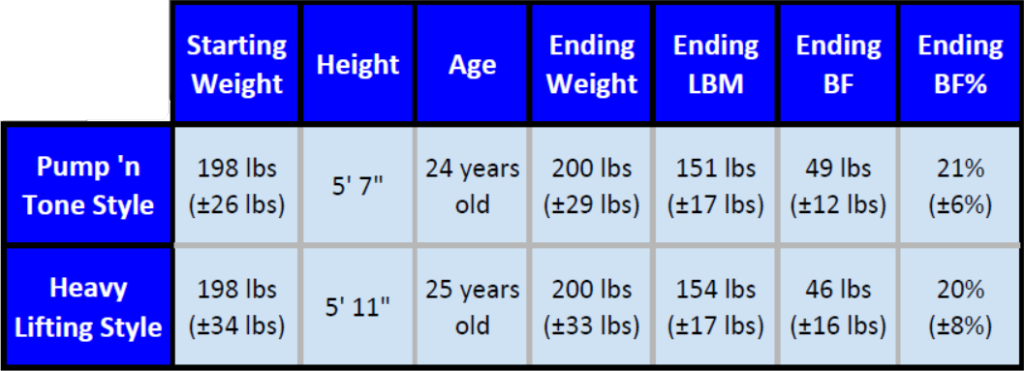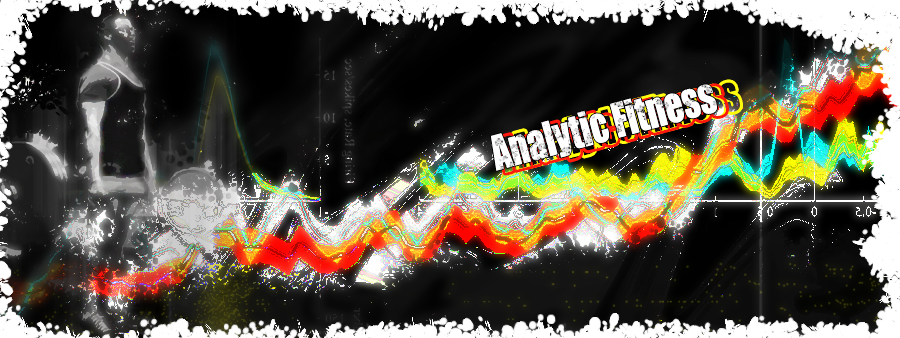For “trained” males
I figure that I’ll start with a paper from Mangine, et al. 2015. The title is The effect of training volume and intensity on improvements in muscular strength and size in resistance-trained men. This paper has the involvement of some prolific researchers that tackle the average gym-goers questions. Let’s be honest. Most everyone I have met in the gym thinks they’re “trained” and has wondered this question. So, I think this is a good paper to look at right away. I was eager to read it, myself, when I came across it.
The question that this study addressed, boiled down, was what training style gets an “advanced” lifter’s muscle size and strength to grow more, training volume or training with heavy weights?
Methods
The researchers had 2 groups of trained (lifting regularly for at least 2 years) males (Sorry, ladies. Who knows how this works for y’all! Well, future posts on other studies will address y’all.) lifting in 2 ways. The “volume” group did a format of 4 sets of 10-12 reps at 70% 1 rep max weight (RM) with each exercise. Your pump ‘n tone kinda work, though I can assure you the weights were enough to require effort. The “heavy” group did 4 sets of 3-5 reps at 90% 1RM with each exercise. Both groups had a 2 week period of training with the researchers before they started to make sure they knew the lifts and what the study would involve.
During the study phase, both groups lifted 4 days a week. Both had 2 session days for legs/back/biceps and 2 session days for chest/shoulders/triceps. Researchers took pre/post blood work, muscle cross sectional area measurements (CSA), whole body-dual energy x-ray absorptiometry (DEXA) scans for lean body mass (LBM) & fat mass (FM), and 1RM tests for the squat & bench press. Pleasantly, to me, the researchers described the 1RM testing like how a powerlifting meet is judged. Technique and full range of motion was paramount. The study training period lasted for 8 weeks after that.
Participant Profile
Now, I care about the descriptive info for the participants in these studies. I am extremely interested in the body weights, compositions, etc. So, you can count on me to share that kind of info for each of the studies that I discuss. The averages are listed in the chart below for this study.

Descriptive data for Stout, et al. 2015
Results
The only statistical difference that I think gym-goers who want to gain muscle care about was…the heavy lifting group gained more arm muscle mass than the pump ‘n tone group. In fact, they gained twice as much in the percent change between pre/post testing. And the pump ‘n tone group lifted twice as much total weight over the study as the heavy lifting group!
…
Of course
…
The heavy lifting group gained 5% muscle cross sectional area on their arm. The pump ‘n tone group gained 2%. So…both actually worked. Just, heavy lifting worked…better(?).
Let’s unpack this, to borrow from my neuroscience presenting friends. What does this kind of change look like in the real world? Table 2 in the paper shows that we’re talking about CSAs on the levels of fractions of an inch. In the real world, would anyone notice a difference between 3% and 5% of a fraction of an inch on an arm? I mean, the difference in size between our left and right arms is larger than this!
Those interested in strength will be curious to learn that both groups increased bench press 1RM, but heavy lifting increased it more (twice as much of an increase as pump ‘n tone). Both programs increased squat 1RM, though neither group did any better statistically.
Implications / Thoughts
These results took dedicated training, sensitive research tools, and grouped stats. All of that was necessary to see these differences between training high volume and training heavy. Out in the real worlds, where there is none of that, the results say that both styles…work to grow muscle(?). After 8 weeks of diligent work, either style will get you a lil more size and a lil more strength. To be critical, I could point out that your individual pump, or bloat, or fat fluctuation levels would produce larger arm size changes.
To be optimistic, this is the reality of the natty world. Yes, in fact, after getting past newbie gainz (Which I will examine studies of in future posts), a difference of 2% in one training style over another for long enough is the best that we can hope for. Once the easy newbie experience is over, then we’re all faced with a life of long hard work to make gainz that are only noticeable over the time course of years and decades.
In Conclusion
Perhaps results would be more different over a longer time course. The study only went 8 weeks. Future studies may address this. The question of the number of participants comes up often. This study had 33 participants. In the training research world, that’s a lot. More so than many other studies, these results should have better shown a difference if there really is one between these training styles, not less so.
The researchers also cited studies that found no differences (even at the 2-5% level) at all when this same topic was studied from different angles. One proposed explanation was that the other studies used single joint isolation exercises. This study used multi joint ones (like the squat and bench press). That may have helped somehow?
Ultimately, this study is useful to us. I think that a nuanced training program should consider these studies and distinctions. For example, if your joints don’t take kindly to heavy weights (like my tennis elbows or recent knee issues), then don’t worry about having to go heavy if you’re just training for size. Pump ‘n tone until you feel better or you fix the problem. Your gainz are not going to shrivel away. And, your strength will continue to develop, just not as much.
#truth
For trained natty individuals, results are slow and small in magnitude after that first year of training.
In conclusion, the best program for size is just the one that you work hard at and can stick to consistently for a while.
If you have any questions about this study or anything I said, please feel free to leave a comment. I will get back to you and others may have insight to offer, too. If you have any questions or topic suggestions that you would like answered as a post, then please email me at robert@analyticfitness.com.
Don’t forget to like Analytic Fitness on Facebook, or follow me on Twitter or the other social medias!





POST REPLY